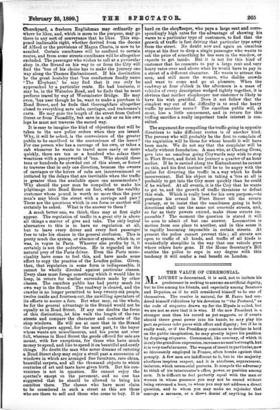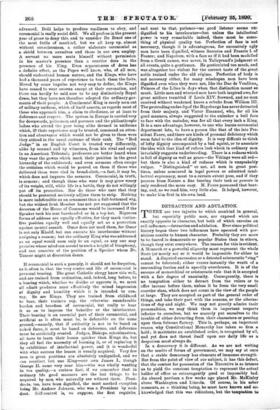THE VALUE OF CEREMONIAL.
MLOUBET is determined, it is said, not to imitate his • predecessor in seeking to assume an artificial dignity, but to live among his friends, and especially among Senators and Deputies, as if he still considered himself to be one of themselves. The resolve is natural, for M. Faure had ren- dered himself ridiculous by his devotion to " the Protocol," as the code of etiquette drawn up for the Elysee is called, but we are not so sure that it is wise. If the new President is a stronger man than his record as yet suggests, or if events should throw great power into his hands, be may play his part asprimus inter pares with effect and dignity; but if he is really weak, or if the Presidency continues to decline in hold on the public imagination, he may greatly injure his position by despising etiquette. Ceremonial, like courtesy, of which it is only the grandiose expression, increases no man's strength, but it is very useful armour. The weapon of insult in particular, now so incessantly employed in France, often breaks against that panoply. A few men are indifferent to it, but in the majority aloofness inspires respect, and it is aloofness, separateness, isolation, which ceremonial protects. It compels the adversary to think of his interlocutor's office, power, or position among men. It is difficult to feel perfectly equal with the man or woman in whose presence you may not be seated without being esteemed a boor, to whom you may not address a direct question, and to whom you may make no rejoinder that conveys a sarcasm, or a direst denial of anything he has advanced. Drill helps to produce readiness to obey, and ceremonial is really social drill. We all profess in the present year of grace to deny this, and to consider De Breze one of the most futile of mankind, but we all keep up, almost without consciousness, a rather elaborate ceremonial as a shield between ourselves and those in our own employ. A servant no more seats himself without permission in his master's presence than a courtier does in the presence of his King. Even separateness of dress has a definite effect, as the Popes well know, who, of all men, should understand human nature, and the Kings, who have had a thousand years of experience to teach them the facts. Moved by some impulse not very easy to define, the Kings have ceased to wear crowns except at their coronation, and there can hardly be said now to he any distinctively Royal dress, but they have not therefore adopted the ordinary gar- ments of their people. A Continental King is rarely seen out of military uniform, which of itself asserts, as regards most of those who approach him, a claim to obedience, or at least to deference and respect.. The system in Europe is carried very far downwards, policemen and postmen and the philanthropic ladies who attend the pcor being alike dressed in uniforms which, ifi their experience may be trusted, command an atten- tion and observance which would not be given to them were they attired in the usual costume of their rank. The "Red Judge" in an English Court is treated very differently, alike by counsel and by witnesses, from his rival and equal in an American Tribunal; professors are better heard when they wear the gowns which mark their position in the great hierarchy of the cultivated; and even sermons often escape the criticism which would be poured on them if those who delivered them were clad in broad-cloth,—a fact, it may be, which does not improve the sermons. Ceremonial, in truth, is armour ; and though those who wear it may grow weary of its weight, still, while life is a battle, they do not willingly put off its protection. Nor do those who care that they should be protected seriously adjure them to strip. Nothing is more indefensible as an ornament than a full-bottomed wig, but the wildest Irish Member has not yet suggested that the decorum of the House of Commons would he increased if the Speaker took his seat bareheaded or in a top hat. Rigorous forms of address are equally effective, for they mark cistinc- tive position equally well and squally act as a protection against mental assault. Omar does not need them, for Omar is not only Khalif, but can execute his interlocutor without assigning a reason ; but the ordinary King who was addressed as an equal would soon only be an equal, as any one may perceive whose mind can ascend to such a height of blasphemy, and can conceive of the position of a Speaker whom Dr. Tanner might at discretion damn.
If ceremonial is such a panoply, it should not be forgotten, as it often is, that the very centre and life of ceremonial is personal bearing. The great Catholic clergy know this well, and are trained from ordination, and, indeed, long before, to a bearing which, whether we dislike or approve it, we must all admit produces most effectively the mixed impression of dignity and humility which it is intended to con. vey. So are Kings. They are trained from childhood to bear, their trainers say, the otherwise unendurable burden and boredom of ceremonial, but really to bear it so as to impress the beholder or the interlocutor. Their bearing is an essential part of their ceremonial, and artificial as it often must be, is defensible on the same ground,—namely, that if authority is not to be based on naked force, it must be based on deference, and deference must be artificially created. Judges, Bishops, schoolmasters, all have to learn their lesson quicker than Kings do, but they all feel the necessity of learning it, or of replacing it by exhibitions of intellectual power, and it is wonderful with what success the lesson is usually acquired. Very few men in great positions are absolutely undignified, and we can recollect but one King—our own James I., though George II. came very near him—who was wholly wanting iu toe quality,—a curious fact, if we remember that in ordinary life good manners are the last things to be acquired by men who naturally are without them. Presi- dents, too, have been dignified, the most marked exception being Mr. Andrew Johnson, who was a President by acci- dent. Self-control is, we suppose, the first requisite, and next to that, patience—no good listener seems un- dignified to his interlocutor—bat unless the intellectual power is very remarkable indeed, there must be some- thing of physical quality too. Perfection of face is not necessary, though it is advantageous, for excessively ugly men have been dignified, witness Socrates and Francis I. of France; and Napoleon, with a face as if it had been modelled from a Greek cameo, was never, in Talleyrand's judgment at all events, quite a gentleman. He gesticulated too much, and was altogether too violent for the correct taste of the great noble trained under the old regime. Perfection of body is not necessary either, for many misshapen men have been dignified even when they were not, like the Dac de VendOme, Princes of the Lilies in days when that distinction meant so much. Little men and wizened men have both inspired awe, for great soldiers trembled if Louis XIV. frowned, and no man received without weakened knees a rebuke from William HI. The protruding under-lip of the Hapsburgs has never detracted from their majesty, and Victor Emanuel, who, for all his good manners, always suggested to the onlooker a bull face to face with the matador, was for all that every inch a King. It is a rare advantage, however, to one who learns ceremonial deportment late, to have a person like that of the late Pre- sident Faure, and there are kinds of personal deficiency which seem fatal to the idea of dignity. It is very difficult to think of lofty dignity accompanied by a bad squint, or to associate the idea with that kind of rufous look which in ordinary men invariably suggests underbreeding. There is a redness which is full of dignity as well as grace—the Vikings were all red— but there is also a kind of redness which is unspeakably vulgar. "Distinguished" or not, all men in great posi- tions, unless armoured in legal powers or admitted intel- lectual supremacy, must to a certain extent pose, and if they possess from Nature a fine bearing their task as poseurs is only rendered the more easy. M. Faure possessed that bear- ing, and, as we read him, very little else. It helped, however, to make him first in his own land.







































 Previous page
Previous page